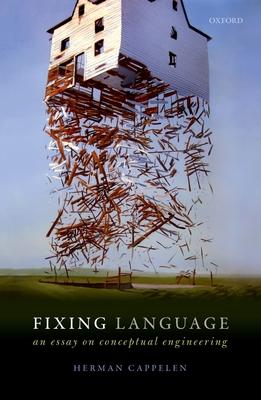Herman Cappelen investigates ways in which language (and other representational devices) can be defective, and how they can be improved. In all parts of philosophy there are philosophers who criticize the concepts we have and propose ways to improve them. Once one notices this about philosophy, it’s easy to see that revisionist projects occur in a range of other intellectual disciplines and in ordinary life. That fact gives rise to a cluster of questions: How does the process of conceptual amelioration work? What are the limits of revision? (How much revision is too much?) How does the process of revision fit into an overall theory of language and communication? Fixing Language aims to answer those questions. In so doing, it aims also to draw attention to a tradition in 20th- and 21st-century philosophy that isn’t sufficiently recognized. There’s a straight intellectual line from Frege and Carnap to a cluster of contemporary work that isn’t typically seen as closely related: much work on gender and race, revisionism about truth, revisionism about moral language, and revisionism in metaphysics and philosophy of mind. These views all have common core commitments: revision is both possible and important. They also face common challenges about the methods, assumptions, and limits of revision.
| FindBook |
有 1 項符合
Fixing Language: An Essay on Conceptual Engineering的圖書 |
 |
Fixing Language: An Essay on Conceptual Engineering 作者:Cappelen 出版社:Oxford Univ Pr 出版日期:2018-05-29 語言:英文 規格:精裝 / 15.9 x 24.1 x 1.9 cm / 普通級 |
| 圖書館借閱 |
| 國家圖書館 | 全國圖書書目資訊網 | 國立公共資訊圖書館 | 電子書服務平台 | MetaCat 跨館整合查詢 |
| 臺北市立圖書館 | 新北市立圖書館 | 基隆市公共圖書館 | 桃園市立圖書館 | 新竹縣公共圖書館 |
| 苗栗縣立圖書館 | 臺中市立圖書館 | 彰化縣公共圖書館 | 南投縣文化局 | 雲林縣公共圖書館 |
| 嘉義縣圖書館 | 臺南市立圖書館 | 高雄市立圖書館 | 屏東縣公共圖書館 | 宜蘭縣公共圖書館 |
| 花蓮縣文化局 | 臺東縣文化處 |
|
|
圖書介紹 - 資料來源:博客來 評分:
圖書名稱:Fixing Language: An Essay on Conceptual Engineering
|











